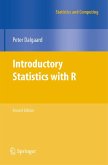Introductory Statistics for the Behavioral Sciences provides an introduction to statistical concepts and principles. This book emphasizes the robustness of parametric procedures wherein such significant tests as t and F yield accurate results even if such assumptions as equal population variances and normal population distributions are not well met.
Organized into three parts encompassing 16 chapters, this book begins with an overview of the rationale upon which much of behavioral science research is based, namely, drawing inferences about a population based on data obtained from a sample. This text then examines the primary goal of descriptive statistics to bring order out of chaos. Other chapters consider the concept of variability and its applications. This book discusses as well the essential characteristics of a group of scores. The final chapter deals with the chi-square analysis.
This book is a valuable resource for students of statistics as well as for undergraduates majoring in psychology, sociology, and education.
Organized into three parts encompassing 16 chapters, this book begins with an overview of the rationale upon which much of behavioral science research is based, namely, drawing inferences about a population based on data obtained from a sample. This text then examines the primary goal of descriptive statistics to bring order out of chaos. Other chapters consider the concept of variability and its applications. This book discusses as well the essential characteristics of a group of scores. The final chapter deals with the chi-square analysis.
This book is a valuable resource for students of statistics as well as for undergraduates majoring in psychology, sociology, and education.
Dieser Download kann aus rechtlichen Gründen nur mit Rechnungsadresse in A, B, BG, CY, CZ, D, DK, EW, E, FIN, F, GR, HR, H, IRL, I, LT, L, LR, M, NL, PL, P, R, S, SLO, SK ausgeliefert werden.









